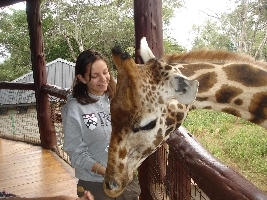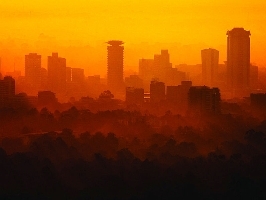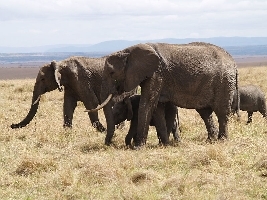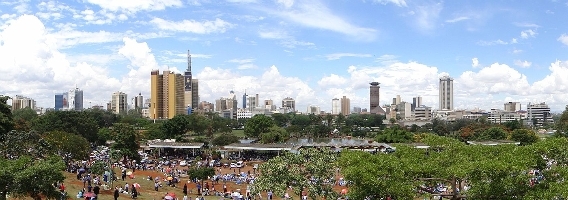International Center of Insect Physiology and Ecology
 The International Centre of Insect Physiology and Ecology (ICIPE) organization in Nairobi, Kenya, has hosted 35 high school and college students since 1998.
The International Centre of Insect Physiology and Ecology (ICIPE) organization in Nairobi, Kenya, has hosted 35 high school and college students since 1998.
Established in 1970, ICIPE has strived to help ensure food security and better health for human kind and its livestock, to protect the environment, and to conserve and make better use of a natural resource.
ICIPE carries out research and development in human, animal, plant, and environmental health.
Interns at ICIPE work alongside renowned international researchers and experts - like Dr. Zeyaur Khan, Dr. Charles Midega, Dr. Rajinder K. Saini, 1995 World Food Prize Laureate Dr. Hans Herren, Dr. Maurice Omolo, and Dr. Hortance Manda - in the the fields and villages of Kaugege, Lwanda, Nguruman and Mbita.
The students also have the opportunity to work with children at Mbita elementary school and travel around Kenya with their host families and colleagues to see sites such as the Maasi Mara National Reserve, National Museum of Kenya, Solar Ice Rink, Karen Blixen Museum, Kenya National Theatre, The Village Market, Nairobi National Park, and the Bird Islands.




Images licensed by CC-BY-SA and GFDL (courtesy: )
Kenya Specific QuestionsSuggested Travel Link: https://travel.state.gov/content/travel/en/international-travel/International-Travel-Country-Information-Pages/Kenya.html Visa required: Tourist Visa Required Passport: Required Travelers Heath & Vaccinations: Visit the CDC website at https://wwwnc.cdc.gov/travel/destinations/list Embassies & Consulates Contact:
Telephone: +(254)(20) 363-6451 Emergencies: +(254)(20)363-6170 Geography: Refer back to "International Internship Sites" Cellular apps (highly suggested to download prior to departure): US Embassy. Airlines the intern will be traveling through. Whatsapp |
COMMON QUESTIONS ASKED OF THE HOST CENTERS BY THE WORLD FOOD PRIZE BORLAUG-RUAN INTERNSWho will pick me up at the airport on the evening I arrive? Where exactly should I meet this person? How will I recognize this person? Who would I contact and at what phone number if my flight is behind schedule and extremely late in arriving? An icipe driver will pick up the interns on arrival at JKIA airport in Nairobi and bring them to the icipe Guest Centre in Nairobi. What is the weather usually like during the period June through August? As you may be aware, weather varies according to the region, but Nairobi and the highland areas are normally cold/rainy from June – August. However, Western Kenya is considerably warmer during this period. Temperature is approximately 15oC at night and 25oC during the day. For more details check out https://www.worldweatheronline.com/mbita-weather-averages/nyanza/ke.aspx Describe the range of attire required during the internship: Is the dress code business or casual? Dress code is casual/smart casual. Are shorts allowed on and/or off campus? Work attire is usually long trousers (jeans are ok) and a shirt. For field trip, long trousers are best. You can wear shorts on campus at weekends, but generally, you should wear modest, practical clothes. Will there be a need for more formal clothing? Not necessary but bring one just in case. What clothing is culturally accepted/common inside and outside the research station for foreigners? You should wear modest, practical clothes in the field. Long trousers are acceptable in the field. General description of accommodation: Dorm-style housing? Home-hosting with a family? Hotel-type/Guesthouse on the icipe campus, with your own room and bathroom. Individual or common bathrooms? Individual. Will I need an electrical adapter for my small appliances? Yes. In Kenya, we use 240V (13 amp), with square pin plug Type G (http://www.iec.ch/worldplugs/typeG.htm). Is there a telephone in my guest room where I will be living? Yes, an outside line can be accessed through the operator, but you should acquire a local SIM card for convenience. Will there be other high school or college students living and working there this summer? No, but there will be postgraduate students living and working on campus. You are welcome to interact with them. Will I have Internet access in the office? Yes, wireless is available in the offices/labs and the Guest Centre. Is there mobile phone coverage throughout Kenya? Yes, most places in Kenya now have mobile phone coverage. Of course, you may encounter areas of little or no coverage if in the field. Get yourself a Safaricom or Airtel SIM when you arrive, as call and SMS costs are far cheaper from local providers. Will I receive an orientation to local customs, where I should and should not go, wise safety practice for the area, etc.? Would such guidance/mentoring throughout the summer come from a person other than my direct project supervisor? If so, who is the person and how do I contact her/him? An induction/orientation tour of icipe facilities will be arranged for you by your host at icipe Mbita Point. You are always free to consult with your supervisors and key staff like the Guest Centre Manager at icipe Mbita Point. Is the workweek Monday through Friday? The typical workday consists of how many hours? Normally a 5-day work week (Monday-Friday), 8:00-5:00 PM, with lunch break 12:30-1:30 PM ; but this may vary according to work plans.
In case of a medical need or emergency, is there a clinic or medical facility near the place I will be working? There is a clinic at icipe Mbita Point with a medical doctor on call. The Aga Khan Hospital is also available but a distance away (approximately 180 km) from the workplace. |
Student Research Projects
Assessing the Effects of Push Pull Technology on Agricultural Productivity in Western Kenya (2023)
Assessing the Influence of Womens' Education and Household Food Security in Western Kenya (2023)
An Investigation of How Farmers Promote Agricultural Production in Western Kenya (2021)
The Great Overcoming in Kenyan Agriculture (2019)
Improving African Rural Lives: The Case of ICIPE and NGO's Collaboration (2019)
Perception and Control of the Fall Armyworm and its Impacts on Livelihoods in Eastern Africa (2018)
Effective Methods of Learning Agricultural Technologies in Kenya and Uganda (2017)
Push-Pull Farming Systems: Knowledge and Perceptions of Kenyan and Ugandan Farmers (2017)
Rural Youth and 'Push-Pull' Farming in Western Kenya (2015)
The Role of Gender in Adoption of Climate Smart Push-Pull Technology in Western Kenya (2014)
Studying Stingless Bees in Kenya (2013)
Assessing Climate Change Impacts on Food Security and Livelihoods in Kenya (2012)
Analyzing Climate Change and Its Impacts on Smallholder 'Push-Pull' Farmers in Western Kenya (2011)
Trapping Tse Tse: Assessing the Use of Host Urine Baits for Sampling and Controlling tsetse (2009)
The Malaria Vector Project (2007)
Utilizing Women Farmer Groups to Disseminate Push-Pull Technology (2006)
The Diamondback Moth's Effect on Food Security (2005)
Analyzing the Tsetse Fly (2004)
Examining the Influence of Education on Household Food Security (2003)
Analyzing the Side Effects of Azadirachtin Botanical Insecticides on Tilapia (2002)
Examining the Influence of Culture and Gender on Household Food Security (2000)


